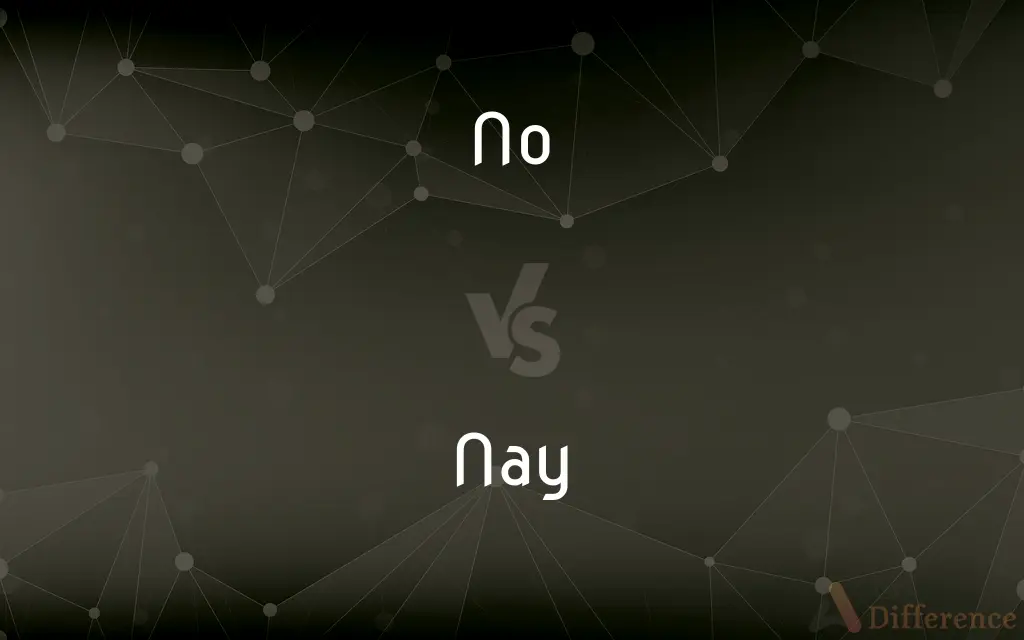No vs. Nay — What's the Difference?
By Maham Liaqat & Urooj Arif — Updated on March 21, 2024
"No" is a common negative response, indicating refusal or disagreement, whereas "Nay" is archaic, often used in formal votes or to emphasize negation.

Difference Between No and Nay
Table of Contents
ADVERTISEMENT
Key Differences
"No" is a versatile term commonly used in everyday language to express refusal, denial, or disagreement. It is straightforward and universally understood in various contexts, from casual conversations to formal settings. On the other hand, "Nay" harks back to older English usage and retains a presence in specific formal or legislative contexts, particularly in voting. It is less about refusal in personal interactions and more about formal disagreement or rejection, often heard in parliamentary procedures or historical texts.
While "no" is versatile and can modify sentences or stand alone as a complete response, "nay" is more constrained in its application, typically used to emphasize negation or in rhetorical contexts. The former fits seamlessly into daily language, adaptable to various tones and situations, from casual declines to strong refusals.
"Nay" tends to be poetic or archaic, lending a dramatic flair when used outside of its formal contexts. Its use in modern language often signals a deliberate nod to tradition or a stylistic choice, contrasting with the straightforward and modern simplicity of "no."
The simplicity and brevity of "no" make it a linguistic staple across cultures and contexts, easily understood and employed by speakers of all ages. "Nay," while less common in everyday speech, serves as a reminder of the language's rich history and the evolution of words over time.
Comparison Chart
Usage
Common in everyday language
Formal, archaic, or stylistic
ADVERTISEMENT
Context
General refusal, denial, disagreement
Formal votes, emphatic negation
Tone
Can vary from casual to firm
Often formal or dramatic
Modern Relevance
Universally understood and used
Limited, mostly in specific contexts
Example Usage
"No, I don't agree."
"Nay, the proposal shall not pass."
Compare with Definitions
No
Denial
No, I won't be attending the party.
Nay
Formal negation
Nay, we reject the terms presented.
No
Prohibition
No smoking in this area.
Nay
Poetic refusal
Nay, I shall not flee from my fate.
No
Refusal
No, you may not borrow my car.
Nay
Emphatic disagreement
Nay, it was not so.
No
Disagreement
No, that's not the correct answer.
Nay
Archaic denial
Nay, such practices are no longer observed here.
No
Rejection
No, we can't accept this offer.
Nay
Legislative voting
All in favor say 'aye,' all opposed, 'nay.'
No
Not any
There is no excuse
No two plants are alike
Nay
No
All but four Democrats voted nay.
No
Used to give a negative response
‘Is anything wrong?’ ‘No.’
Nay
And moreover
He was ill-favored, nay, hideous.
No
Not at all; to no extent
They were no more able to perform the task than I was
Nay
A denial or refusal.
No
Not
I'll no be a minute
Nay
A negative vote or voter.
No
Variant spelling of Noh
Nay
No.
No
Variant of Noh.
Nay
Introducing a statement, without direct negation.
No
A negative response; a denial or refusal
The proposal produced only noes.
Nay
Or rather, or should I say; moreover (introducing a stronger and more appropriate expression than the preceding one).
His face was dirty, nay, filthy.
No
A negative vote or voter.
Nay
(archaic) No.
No
Used to express refusal, denial, disbelief, emphasis, or disagreement
No, I'm not going. No, you're wrong.
Nay
A vote against.
I vote nay, even though the motion is popular, because I would rather be right than popular.
No
Not at all; not by any degree. Often used with the comparative
No better.
No more.
Nay
A person who voted against.
The vote is 4 in favor and 20 opposed; the nays have it.
No
Not
Whether or no.
Nay
(archaic) A denial; a refusal.
No
(Informal) Used to indicate agreement with a preceding statement, especially when followed by a stronger judgment supporting that statement
"The car is getting old." "No, I know. It must be 10 years old by now.".
Nay
(obsolete) To refuse.
No
Used to express strong refusal, doubt, or disbelief.
Nay
(obsolete) Nary. en
No
Not any; not one; not a
No cookies are left.
Nay
No; - a negative answer to a question asked, or a request made, now superseded by no. Opposed to aye or yea. See also Yes.
And eke when I say "ye," ne say not "nay."
I tell you nay; but except ye repent, ye shall all likewise perish.
And now do they thrust us out privily? nay, verily; but let them come themselves and fetch us out.
He that will not when he may,When he would he shall have nay.
No
Not at all; not close to being
He is no child.
Nay
Not this merely, but also; not only so, but; - used to mark the addition or substitution of a more explicit or more emphatic phrase.
No
Hardly any
Got there in no time flat. See Usage Note at nor1.
Nay
Denial; refusal.
No
Not any.
No one
There is no water left.
No hot dogs were sold yesterday.
No phones were at the store.
No two people are the same..
There was no score at the end of the first period. (The score was 0-0.)
Nay
A negative vote; one who votes in the negative.
No
Hardly any.
We'll be finished in no time at all.
Fifty pounds for this is no money, really.
Nay
To refuse.
No
Not any possibility or allowance of (doing something).
No smoking
There's no stopping her once she gets going.
Nay
A negative;
The nays have it
No
Not (a); not properly, not really; not fully.
My mother's no fool.
Working nine to five every day is no life.
Nay
Not this merely but also; not only so but;
Each of us is peculiar, nay, in a sense unique
No
(with following adjective) not, not at all
No
More and less, and idiomatically before other comparatives.}}
It is a less physical kind of torture, but no less gruesome.
You’re no better than a common thief.
Look no further than one's nose
This is no different from what we've been doing all along.
No
(informal) Used idiomatically before certain other adjectives.
This thing is no good.
The teacher’s decision was no fair.
No
Not
I just want to find out whether she's coming or no.
No
(archaic) nodot=a
No
Without
No
Like
No
Not, does not, do not, etc.
No
A negating expression; an answer that shows disagreement, denial, refusal, or disapproval
No
A vote not in favor, or opposing a proposition
The workers voted on whether to strike, and there were thirty "yeses" and two "nos".
No
Not any; not one; none; as, yes, we have no bananas; - often used as a quantifier.
Let there be no strife . . . between me and thee.
That goodness is no name, and happiness no dream.
No
Nay; not; not at all; not in any respect or degree; - a word expressing negation, denial, or refusal. Before or after another negative, no is emphatic.
We do no otherwise than we are willed.
I am perplx'd and doubtful whether or noI dare accept this your congratulation.
There is none righteous, no, not one.
No! Nay, Heaven forbid.
No
A refusal by use of the word no; a denial.
No
A negative vote; one who votes in the negative; as, to call for the ayes and noes; the noes have it.
No
A negative;
His no was loud and clear
No
A radioactive transuranic element synthesized by bombarding curium with carbon ions; 7 isotopes are known
No
Quantifier; used with either mass nouns or plural count nouns for indicating a complete or almost complete lack or zero quantity of;
We have no bananas
No eggs left and no money to buy any
Have you no decency?
Did it with no help
I'll get you there in no time
Have some milk
Some roses were still blooming
Having some friends over
Some apples
Some paper
No
Referring to the degree to which a certain quality is present;
He was no heavier than a child
No
Not in any degree or manner; not at all;
He is no better today
No
Used to express refusal or denial or disagreement etc or especially to emphasize a negative statement;
No, you are wrong
Common Curiosities
How does "no" function in a sentence?
"No" can stand alone as a response or modify nouns, verbs, and adjectives to indicate negation or refusal.
What are the connotations of "nay" in modern usage?
When used today, "nay" often carries formal, poetic, or dramatic connotations, sometimes used for emphasis or stylistic effect.
Why is "nay" considered archaic?
"Nay" hails from older English and has largely been replaced by "no" in most contexts, retaining use in specific formal settings or for stylistic purposes.
Are there any contexts where "nay" is preferred over "no"?
In formal votes, such as in parliamentary procedures, or in literary and poetic contexts, "nay" might be preferred for its traditional or emphatic tone.
Is "nay" used in any modern slang or expressions?
"Nay" is not commonly found in modern slang; its use is generally restricted to more formal or traditional expressions.
Can "no" and "nay" be used interchangeably?
While both indicate negation, "no" is more versatile and common, whereas "nay" is formal or archaic, making them not fully interchangeable.
How do children learn the difference between "no" and "nay"?
Children typically learn "no" as part of basic language acquisition, while "nay" is usually encountered later, in more formal, historical, or literary contexts.
Are there any famous quotes or literary works that highlight the use of "nay"?
Shakespearean plays and historical speeches often feature "nay" to convey strong refusal or negation, underscoring its dramatic effect.
How does the tone of voice affect the use of "no" and "nay"?
Tone can significantly impact the perception of both words; "no" can range from gentle to firm, while "nay" typically conveys a more solemn or resolute refusal.
Is "nay" still used in modern English?
"Nay" is rarely used in everyday language but can be found in formal or legislative contexts and historical or poetic works.
Do other languages have similar distinctions as "no" and "nay"?
Many languages have formal and informal or archaic ways of expressing negation, though the specifics vary widely.
How does popular media influence the perception of "nay"?
Historical dramas, literature, and certain forms of media can romanticize "nay," lending it an air of gravitas or antiquity.
Can "no" carry the same formal weight as "nay"?
"No" can be used formally, but "nay" specifically implies a traditional or ceremonious formality that "no" does not inherently possess.
Is it appropriate to use "nay" in everyday conversations?
Using "nay" in casual speech might seem out of place or pretentious, given its formal or archaic connotations.
What is the etymology of "nay"?
"Nay" originates from Middle English, used as a negation term, and its usage has evolved over time, retaining a more specialized role in modern English.
Share Your Discovery

Previous Comparison
DBA vs. DBMS
Next Comparison
Doula vs. MidwifeAuthor Spotlight
Written by
Maham LiaqatCo-written by
Urooj ArifUrooj is a skilled content writer at Ask Difference, known for her exceptional ability to simplify complex topics into engaging and informative content. With a passion for research and a flair for clear, concise writing, she consistently delivers articles that resonate with our diverse audience.














































